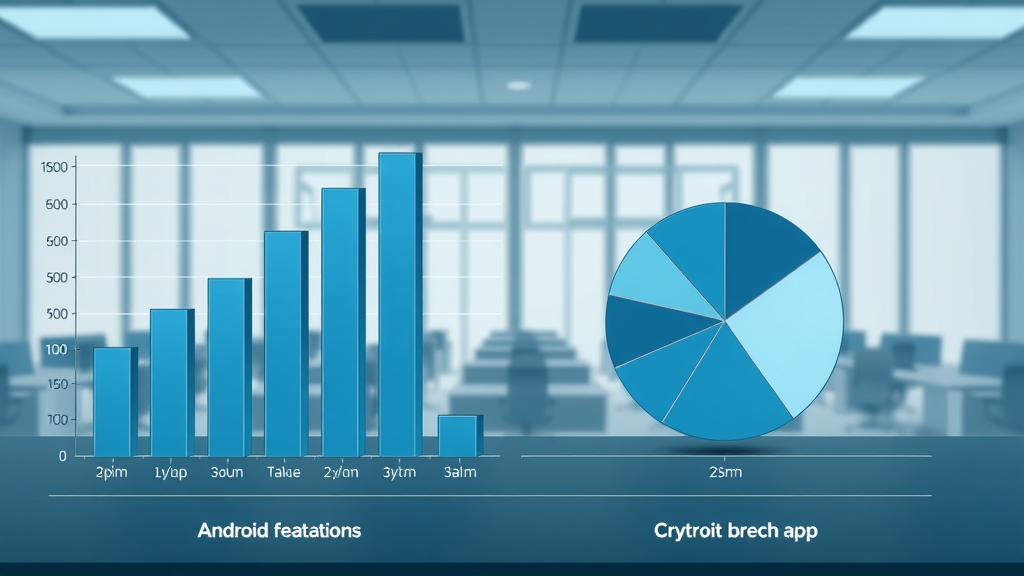"Cybersecurity firm analysts have revealed that more than 500 bank, crypto, and payment apps are being targeted by hackers spying on Android phones in real time, putting millions of users’ sensitive data at immediate risk."
Did you know that over 500+ banking, crypto, and payment apps are under daily real-time attack by hackers seeking to snatch your sensitive information? The scale and speed of these data breaches mean anyone with an Android phone—especially those in the United States—could be just one click away from becoming the next victim. As banks, fintechs, and even daily hodl users grapple with notorious banking malware, staying ahead of cybersecurity threats isn't just for the tech-savvy anymore—it's a matter of personal and financial safety for all.
How Real-Time Hacking Threatens Android Phones: Alarming Statistics and the Latest Data Breach Incidents
The threat of hackers spying on Android phones in real time has reached alarming new highs. According to industry-leading cybersecurity firms, a surge in data breach cases is linked directly to sophisticated malware hitting Android devices worldwide. Not only are these breaches increasing, but their precision is chilling—bank account details, personal data, and login details are targeted as soon as users interact with legitimate banking apps. This trend goes beyond random attacks; it reflects a calculated effort by organized cybercrime syndicates to compromise sensitive information using real-time surveillance tactics.
Consider that notorious banking malware is hitting Android phones at a pace rarely seen before. In recent months, attackers have employed advanced virtualization techniques and social engineering to bypass traditional defenses. In 2024 alone, cybersecurity firms documented dozens of breaches leveraging remote access tools, enabling hackers to seize information and control banking apps in real time. These patterns suggest a shift from opportunistic hacks to sophisticated campaigns targeting users’ financial lives and privacy on a global scale.

- Surge in data breach cases among Android smartphone users
- Real-time hacking attempts tracked by leading cybersecurity firms
- Sensitive payment and crypto apps most at risk
- Case studies of major data breaches on Android phones
Understanding How Hackers Spy on Android Phones in Real Time According to Top Cybersecurity Firms
To truly defend yourself, it's crucial to first understand the complex and evolving methods hackers use to compromise Android phones in real time. Recent reports from leading cybersecurity firms like Zimperium and others suggest that malware employs evermore devious strategies. From phishing attempts that mimic official bank login screens to malicious apps masquerading as productivity tools, the threat landscape is constantly shifting. Often, victims don't even realize hackers have gained access to their devices until money vanishes from their bank account or private details are sold on the dark web.
These attacks are not isolated—daily hodl and fintech media have highlighted how quickly new malware variants emerge. A single malicious download or careless tap on a suspicious link can install a hidden surveillance app that operates silently, collecting sensitive information and relaying it to attackers. Even legitimate banking apps can be compromised if hackers exploit vulnerabilities in the Android OS or embed malware in software updates. These realities reinforce the need for proactive defense and education among all Android users, regardless of technical background.
Methods Hackers Use to Spy on Android Phones in Real Time
Perhaps the most concerning aspect of hackers spying on Android phones in real time is the diverse arsenal of attack vectors at their disposal. Phishing attacks and social engineering remain alarmingly effective, with hackers simply mimicking a login screen in a way that deceives even cautious users. Once an unsuspecting victim enters their credentials, malware installs a malicious code that grants remote access, effectively allowing hackers to steal login details, monitor transactions, and control banking apps with frightening efficiency. Cybersecurity firm analysts have warned that this type of banking malware is hitting Android phones more frequently than ever before.
In addition, hackers take advantage of unpatched vulnerabilities in Android OS or outdated apps, granting them an easy way into devices. Criminals often embed malware in seemingly harmless apps available through third-party stores, using a virtualization technique that’s hard to detect. Once inside, the malware can record keystrokes, capture screenshots, intercept SMS codes, and even listen in on calls, all in real time.

- Phishing attacks and social engineering
- Exploiting vulnerabilities in Android OS
- Malware embedded in app downloads
- Remote access tools
Data Breach Patterns Revealed by Cybersecurity Firms
The recurring data breach patterns disclosed by cybersecurity firms highlight a growing trend: targeted, high-value apps are in the crosshairs. Analysts have plotted a timeline of notable breaches affecting Android phones—many involving multimillion-dollar losses from bank, crypto, and payment app exploits. The reputational damage for users is severe, as personal data leaks result in financial loss, identity theft, and ongoing psychological stress. Notably, banking malware is hitting Android phones in waves, with each outbreak more potent than the last, as hackers refine techniques and evade standard defenses.
Industries most frequently targeted include banking, fintech, cryptocurrency platforms, and high-value e-commerce. Attackers use a mix of publicly known vulnerabilities and zero-day exploits to bypass even seasoned security defenses. Cybersecurity firm Zimperium notes that the speed and force of these attacks leave little room for traditional mitigation—swift action and updated defense strategies are essential for minimizing risk.
- Timeline of notable breaches affecting Android phones
- Financial and reputational impact on users
- Industries most targeted by real-time hacking
| Recent Data Breach Cases Involving Real-Time Android Phone Spying | Breach Date | Apps Impacted | Data Compromised | Cybersecurity Firm Involved |
|---|---|---|---|---|
| Teabot Banking Malware Surge | March 2024 | Over 200 banking apps | Login details, 2FA codes, account info | Zimperium |
| Crypto Exchange Attack Wave | February 2024 | Major crypto wallet apps | Wallet seed phrases, personal data | Lookout Labs |
| Payment App Credential Breach | December 2023 | Top 50 payment apps | Login credentials, transaction history | Check Point Research |

Why 500+ Bank, Crypto, and Payment Apps Are Frequent Targets for Hackers Spying on Android Phones
It is no coincidence that over 500 bank, crypto, and payment apps remain in the crosshairs of hackers spying on Android phones in real time . The lucrative opportunity presented by digital finance fuels relentless cyberattacks. Banking apps, in particular, store highly sensitive information, and a single successful exploit can open the floodgates to vast chains of identity theft and unauthorized transactions. This profitability incentivizes hackers to continually refine their tactics, making these apps the most tempting targets on the Android platform.
Cybersecurity firm research also shows many payment and crypto apps exhibit common weaknesses—lax encryption, infrequent updates, and misconfigured settings are all too common. With the massive popularity of Android devices globally, the sheer number of users utilizing daily hodl apps or managing multiple banking accounts from mobile phones only increases the threat surface. Combined with the open-source nature of Android, these vulnerabilities perpetuate a dangerous environment where large-scale data breach events have become the “new normal.”
Common Weaknesses in Android App Security
Banking and payment apps often lack robust security protocols—poor encryption, insufficient security measures, and delayed patching are recurring issues cited by cybersecurity experts. The problem is compounded when app developers fail to regularly update software, leaving known vulnerabilities exposed. Misconfigured permissions also allow apps far greater access than needed, such as reading SMS codes or accessing call logs, thus multiplying the risk of a real time breach that can result in stolen bank account data and personal information.
Furthermore, insecure third-party integrations add another layer of risk, as poorly vetted software libraries or APIs may unintentionally offer backdoors to sophisticated hackers. The result is a perfect storm: a growing fleet of payment and crypto apps providing attackers with multiple pathways to infiltrate and compromise sensitive information.

- Poor encryption or insufficient app security
- Lack of regular security updates
- Misconfigured permissions and settings
- Insecure third-party integrations
Statements from Leading Cybersecurity Firms on Targeted Apps
"Despite heightened awareness, the sheer number of targeted payment, bank, and crypto apps on Android poses an ongoing challenge for users and cybersecurity professionals alike."
This statement from a prominent cybersecurity firm echoes a growing consensus: the threat is not slowing down. As malware is hitting Android phones with greater sophistication, cybersecurity professionals urge app developers and users alike to adopt a defense-first mindset. Only through frequent updates, user education, and the use of trusted security apps can users stand a fighting chance against real time hackers aiming to steal sensitive data from legitimate banking apps and more.
Steps You Can Take to Prevent Hackers from Spying on Android Phones in Real Time
Protecting your Android phone from real-time hackers is not an impossible task—but it does require vigilance and informed choices. Prevention starts with the basics: always update your operating system and apps as soon as new versions become available. Reputable cybersecurity firms agree that the vast majority of successful attacks take advantage of unpatched vulnerabilities—a single missed update can leave your device open to known malware installs. Next, only download apps from trusted sources like the official Google Play Store, avoiding third-party app repositories that are notorious for distributing banking malware disguised as essential utilities.
Equally vital is the use of robust mobile security software. Modern security solutions now offer real time threat detection and timely alerts for suspicious activity, giving users a crucial early-warning system. Vigilance is also required when reviewing links, emails, and messages—be wary of phishing attempts designed to lure you into entering sensitive information or mimicking a login screen. Finally, take control of your privacy by reviewing and restricting unnecessary permissions for all installed apps, especially those involving payment, bank account, and crypto platforms.
- Regularly update your Android phone and apps
- Download apps only from trusted sources
- Utilize reputable mobile security software
- Be vigilant against phishing attempts and suspicious links
- Review and restrict unnecessary app permissions
Recommended Security Apps for Android Phones: User Reviews and Data Breach Performance
Choosing the right mobile security software can offer an invaluable layer of protection against hackers spying on Android phones in real time . Top-rated apps like Bitdefender Mobile Security, Norton Mobile Security, and Avast have consistently outperformed others in thwarting attacks and minimizing the likelihood of a catastrophic data breach. User reviews routinely highlight the importance of features like real-time malware scanning, app permission tracking, and intrusion detection.
Independent testing by major cybersecurity firms validates these user reports—solutions with the best data breach performance frequently incorporate machine learning and cloud-based scanning to detect threats before they infect devices. Combining app reviews, lab assessments, and real-time threat response data helps users identify the most effective tools for thwarting notorious banking malware and protecting sensitive payment or bank account details.
"The best defense against real-time spyware is proactive vigilance and a reliance on reputable security tools," advises a lead researcher from a global cybersecurity firm.

People Also Ask
How do hackers gain real-time access to Android phones?
Hackers commonly obtain real-time access by exploiting unpatched vulnerabilities in the Android OS, sending phishing messages that trick users into downloading malicious apps, or leveraging social engineering tactics. Many also use banking malware that installs a malicious code—simply mimicking a login screen or stealing credentials without user awareness. Remote access tools and virtualization techniques allow hackers to monitor and control devices in real time, even bypassing traditional security measures.
Can a cybersecurity firm help protect against hackers spying on Android phones?
Yes, partnering with a cybersecurity firm can provide a robust line of defense. These firms offer continuous monitoring, threat intelligence, and advanced security solutions that detect and neutralize threats proactively. By staying ahead of the latest attack patterns, cybersecurity experts ensure your device is better shielded from real-time hackers targeting personal and financial data.
What should you do if you suspect your Android phone is being spied on in real time?
If you suspect your Android phone is compromised, immediately disconnect from all networks, run a reputable security scan, and reset the device to factory settings if needed. Change all sensitive passwords from a secure device and contact your bank or financial providers about potential risks to your bank account or payment apps. For additional safety, consult with a cybersecurity firm or professional for further investigation and advice.
Expert Opinions: Are Android Phones More Vulnerable to Real-Time Data Breach than Other Devices?
There is growing agreement among security professionals that Android phones present a larger attack surface compared to some other mobile platforms. One primary reason is the open-source nature of Android OS, which offers flexibility to both developers and hackers. Unlike iOS, the diversity of hardware and customization options in Android can lead to fragmented updates and delayed security patches. As a result, breaches impacting personal data, bank account details, and even daily hodl transactions are often more widespread and persistent.
Cybersecurity firm reports highlight how the scale and speed at which malware is hitting Android phones exacerbate the risks. While robust security measures can narrow this gap, consistent vigilance and prompt updates remain critically important. Notably, renowned analysts emphasize that no system is immune, but Android’s popularity and openness make it a particular favorite for those seeking to orchestrate a real time data breach on a large scale.

- Open-source Android OS increases attack surface
- Delayed security patches compared to iOS
- Greater variety of hardware and customizations
FAQs About Hackers Spying on Android Phones in Real Time
- How can I tell if my bank app is at risk of a data breach on Android? Look for unusual activity, frequent requests for re-authentication, or suspicious prompts mimicking your app’s login screen. If the app hasn’t received security updates in a while or you’ve installed apps from unofficial sources, the risk is significantly higher. Consider scanning your device regularly for malware.
- Are SMS and call logs vulnerable when hackers spy on my phone? Yes, hackers often target SMS logs to intercept verification codes or personal messages. Banking malware can access call logs as well, sometimes extracting additional sensitive information or affecting your device’s security further. Restrict unnecessary permissions and use security tools to detect such intrusions.
- Can two-factor authentication prevent real-time spying? Two-factor authentication (2FA) adds a crucial extra security layer, but it isn’t foolproof. Hackers may still find ways to intercept 2FA codes, especially if they control SMS permissions on your phone. Use app-based or hardware token 2FA whenever possible for added safety.
Key Actions: Staying Ahead of Hackers Targeting Banking, Crypto, and Payment Apps on Android Phones
- Stay informed on recent data breaches and real-time threats reported by cybersecurity firms.
- Strengthen device and app security with best practices—frequent updates, trusted app sources, and permission management.
- Leverage the latest insights and detection tools from renowned cybersecurity professionals for a proactive defense.
Next Steps—Protect Your Sensitive Data and Stay Vigilant Against Hackers Spying on Android Phones in Real Time
Act now—update your apps, strengthen your defenses, and rely on trusted security solutions to outsmart hackers targeting your baking, crypto, and payment data on Android phones.
 Add Row
Add Row  Add
Add 




Write A Comment